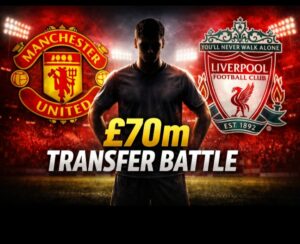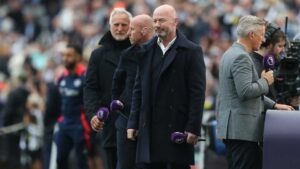Caleb Williams Addresses Controversy in Chicago with a Bold Statement
In the high-stakes world of the NFL, few players arrive under more intense scrutiny than the number one overall draft pick. For Caleb Williams, the former USC standout and Heisman Trophy winner, the pressure has been amplified by not only his on-field expectations but also the swirling rumors surrounding his entry into the league—particularly the notion that he was reluctant to join the Chicago Bears. After weeks of speculation, Williams has issued a bold, unflinching statement aimed at silencing critics and reaffirming his commitment to the Windy City.

The Controversy Unfolds
The drama began when excerpts from a forthcoming biography on NFL quarterbacks hinted that Williams and his camp considered ways to avoid being drafted by the Chicago Bears. The implication was that Williams, like some high-profile quarterbacks before him, might attempt to steer his professional destiny toward a more stable or desirable franchise—perhaps one with a better recent track record or a more established infrastructure.
These suggestions ignited a firestorm among Bears fans and pundits alike. For a franchise with a storied past but limited recent success at the quarterback position, the idea that their newest hope might be hesitant to embrace the team struck a nerve. Critics called it arrogance. Others labeled it strategic career planning. Either way, the speculation placed Williams under an uncomfortable spotlight before he had even taken a snap.
Caleb Williams Breaks His Silence
In a recent media appearance at Halas Hall, Williams addressed the controversy head-on. He didn’t hedge or dodge the question—he took it straight on.
“Look, a lot has been said. A lot has been written,” Williams began. “The truth is, I’m here. I’m a Bear. I want to be here. Any conversations that happened months ago were just thoughts—nothing more. I didn’t ask out. I didn’t try to manipulate the process. That’s not who I am.”
The statement was clear and direct, a calculated but heartfelt attempt to put rumors to rest. More than a PR maneuver, it was a bold assertion of agency from a young quarterback who is well aware of the platform he now occupies.
“This city embraced me from day one,” he continued. “And I want to return that love—not with words, but with wins. My focus is on building something special here.”
A Legacy of Quarterback Skepticism
Part of what made the controversy so potent is the historical context in Chicago. The Bears have long struggled to develop a franchise quarterback. Since the days of Sid Luckman in the 1940s, consistent elite play at the position has eluded the franchise. Mitchell Trubisky, Justin Fields, and Jay Cutler are just a few recent names that failed to meet lofty expectations. The result is a city that is both desperate for quarterback stability and deeply skeptical of those who claim they can provide it.
For Williams, this history presents both a challenge and an opportunity. The controversy may have been an unwelcome distraction, but it has also given him an early platform to demonstrate leadership. By addressing it directly, he not only defused some of the tension but also set a tone for how he plans to navigate adversity.
Public Reaction: A City Divided
Reactions to Williams’ statement were swift and divided. On social media, Bears fans expressed a mix of relief and continued skepticism. Some praised his maturity and willingness to confront the issue. Others remained wary, viewing the controversy as a red flag about his mindset.
Local sports talk radio buzzed with heated debates. Was Williams being sincere? Did his father’s influence—which has been widely reported as strong—play too large a role in the initial controversy? And most importantly, could he deliver on the field?
In a city as passionate as Chicago, those questions will linger until the results speak for themselves. Winning, of course, cures all.
The Media’s Role in the Narrative
Much of the controversy stemmed not from anything Williams directly said, but from a media landscape eager to construct narratives. The NFL draft process has become as much about storytelling as scouting. For months leading up to the draft, headlines speculated about whether Williams would pull an “Eli Manning” and demand a trade, or whether he would leverage his name, image, and likeness (NIL) opportunities to stay in college.
Williams’ silence during that period—typical of most high-profile prospects—left a vacuum. The media filled it with conjecture, some of it informed, some purely speculative. The resulting controversy said as much about the league’s ecosystem as it did about the quarterback himself.
The Importance of Owning the Moment
What makes Williams’ response significant is that it represents an early example of what it means to “own the moment” as a franchise quarterback. Every great leader in sports faces a crucible—an early test of character or resolve that shapes public perception. For Williams, this was that moment.
He could have sidestepped the issue or issued a bland, boilerplate statement. Instead, he leaned into it. That matters. It sends a message to his teammates, to the coaching staff, and to the fanbase: I’m not afraid of the hard questions. I’ll take the heat if I need to. That, more than arm talent or stats, is what defines leadership in the NFL.
On-Field Implications: More Than Words
Williams’ bold statement, however, is just that—a statement. The real test will come on the field. With the Bears continuing to rebuild under new head coach Ben Johnson, the infrastructure is improving but still fragile. The offensive line has been a perennial weakness. Skill position talent is emerging, but cohesion and consistency remain elusive.
Williams has the tools to succeed: a quick release, a high football IQ, excellent pocket mobility, and playmaking instincts. But transitioning from college stardom to NFL reliability is notoriously difficult. The mental side of the game—processing defenses, reading coverages, commanding a huddle—takes time.
Yet this controversy may actually accelerate that growth. By confronting a public challenge early in his career, Williams has had to mature quickly. That maturity could prove invaluable in tight games and locker room dynamics.
The Locker Room View
Perhaps the most important audience for Williams’ statement wasn’t the media or fans—it was his teammates. NFL locker rooms are finely tuned environments where authenticity is valued above all. Teammates can sense when someone is being disingenuous. A young quarterback needs to earn the respect of veterans, especially on a team trying to shed a losing culture.
Reports from within the Bears’ facility suggest that Williams’ response played well. By publicly defending his offensive line and taking accountability for the team’s shortcomings, he earned points with players who’ve been through the grind. He spoke not as a celebrity quarterback, but as a teammate.
“He didn’t throw anyone under the bus,” said one anonymous player. “He owned it. That goes a long way in this league.”
A Turning Point in the Bears’ Culture?
The Bears’ culture has long been defined by grit, defense, and nostalgia. Williams represents a potential pivot—toward modern offensive football, star power, and perhaps, finally, quarterback excellence. The way he handled the early turbulence could be a blueprint for a new cultural identity: one that values accountability, transparency, and forward momentum.
If Williams continues to handle pressure with poise and performs on the field, he could become the face not just of a team, but of a city longing for a football renaissance.
What Comes Next
As the 2025 NFL season approaches, Williams will have every opportunity to rewrite the narrative. Training camp will be crucial, not just for scheme installation, but for team bonding and public trust. Preseason games will offer glimpses into how he handles professional defenses and adversity under center.
The Bears’ early-season schedule will likely be the most scrutinized in years. Each game, each drive, each decision will be analyzed not just through the lens of performance, but also persona. Is this the leader Chicago has been waiting for?
A Bold First Step
Caleb Williams’ decision to confront the controversy with clarity and confidence was a bold first step in what promises to be a high-stakes NFL career. Whether he ultimately succeeds will depend on countless factors: coaching stability, roster health, his own growth trajectory. But in a moment that could have easily unraveled into a PR disaster, Williams turned potential weakness into strength.
He showed fans, teammates, and critics alike that he’s not just here to play quarterback—he’s here to lead. And in a city that reveres resilience, that just might be the most important play he’s made yet.







